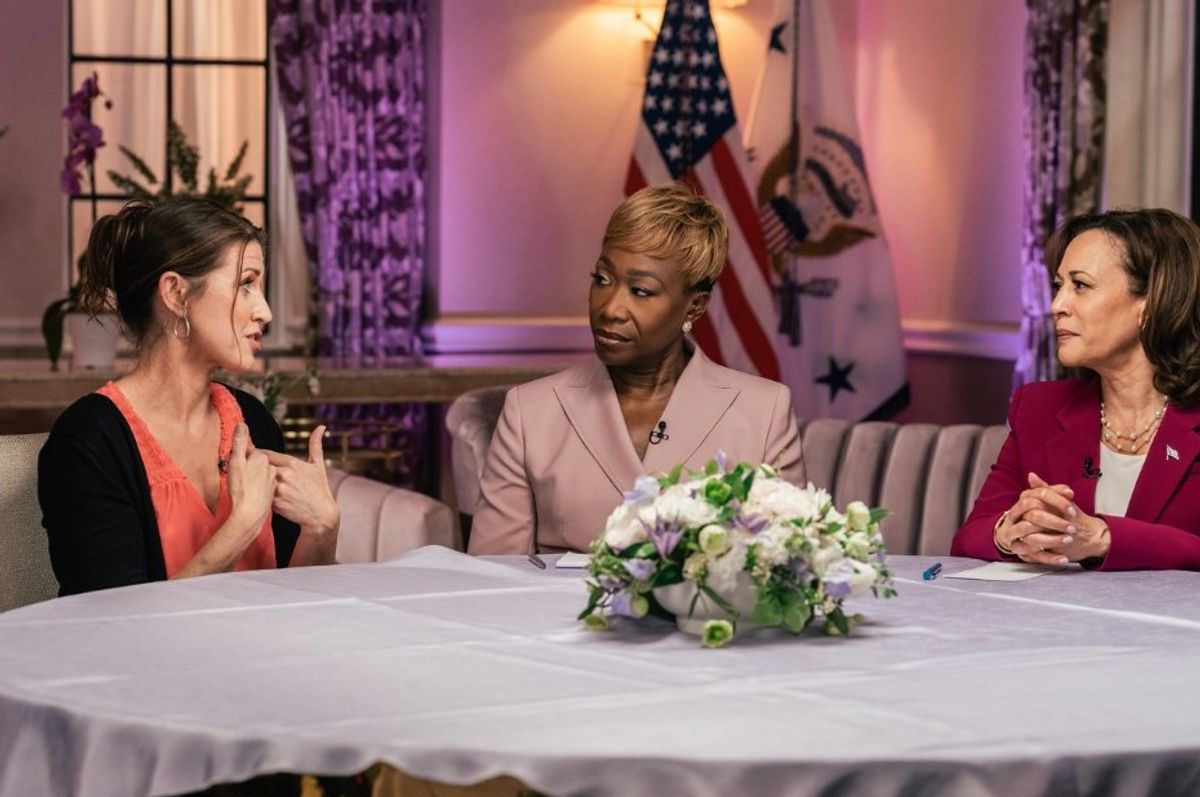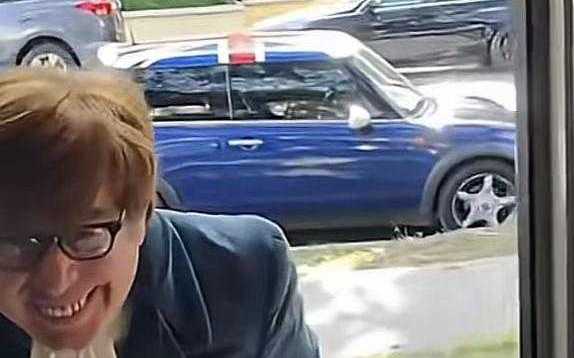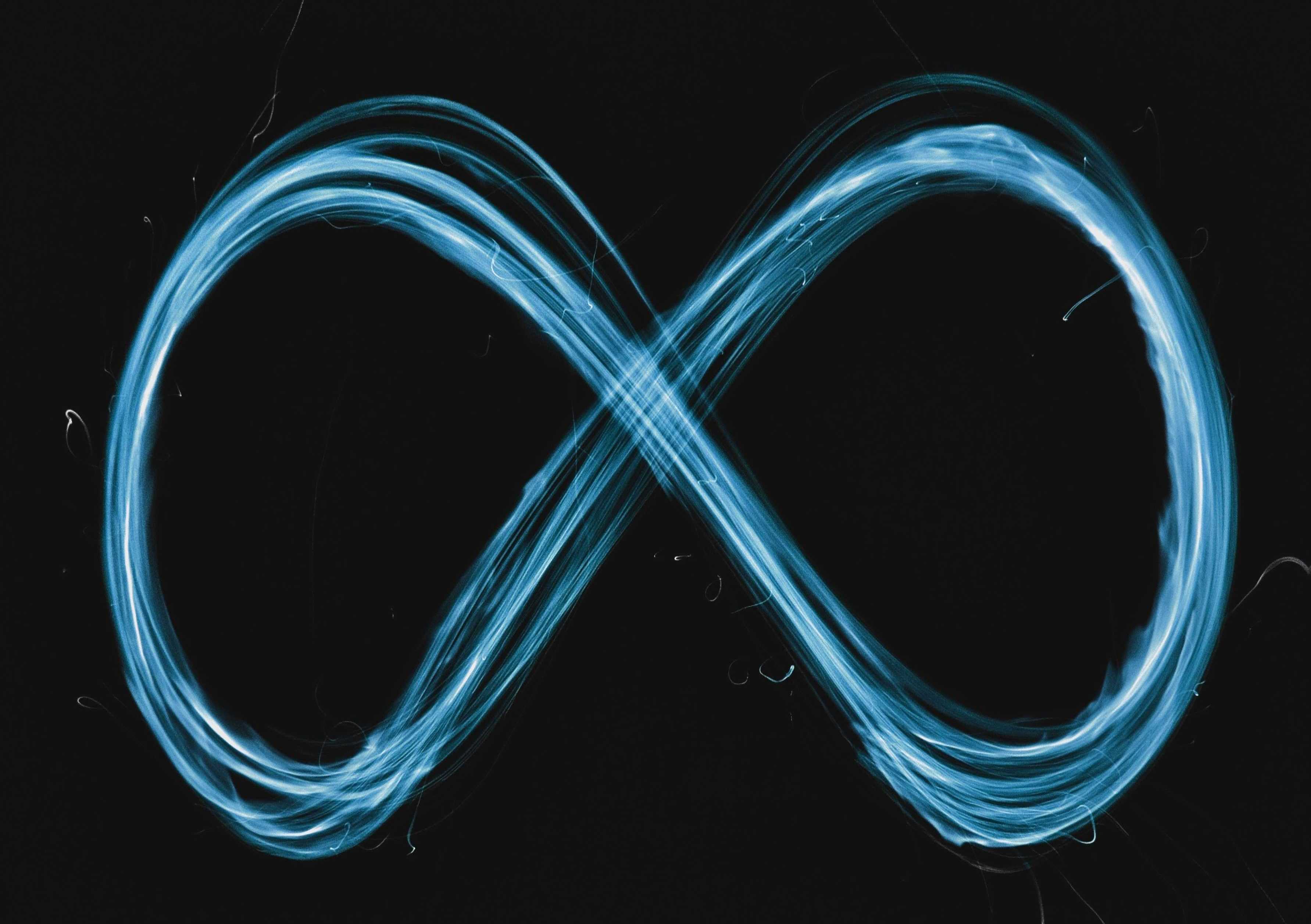I did a roundtable with the Vice President about abortion. Here are 4 things that surprised me.
The conversation was important, but in some ways the experience was nothing like I expected it to be.

Upworthy associate editor Annie Reneau chatting with Joy Reid and Kamala Harris in an MSNBC roundtable
It's been a very weird week.
I'm a writer and editor—not a medical professional, legal expert or political activist in any way—so imagine my surprise when I got a message from Vice President Kamala Harris's senior advisor inviting me to join a roundtable discussion on MSNBC for the one-year anniversary of the Dobbs decision that overturned Roe v. Wade. I thought someone might be pranking me, but nope. The invite was real.
Apparently, someone had read an op-ed I'd written years ago about how it's possible to be morally pro-life but politically pro-choice and felt that my voice would add something to the discussion. The panelists included the lead plaintiffs in the Dobbs vs. Jackson Women's Health Organization and the Texas Abortion Ban lawsuits, two activists involved in the fight for reproductive rights, a Texas OB-GYN who has seen the implications of the Dobbs decision in his own practice…and me.
I felt remarkably average among these experts on the issue, but I think that was the point. My view represents millions of average American voters who may feel conflicted about where they stand on abortion morally and legally and are trying to reconcile their personal or religious beliefs with what they think our laws should be. Additionally, as someone with no political affiliation or loyalty to any party, I could speak about grappling with this issue without any partisan pressure or influence.
I'd like to point out that I'm wary of most politicians and well aware of biases in the media, so despite feeling honored to be asked, I was a bit hesitant to participate. I certainly didn't want to contribute to the partisan divide if I could help it. But because abortion is such a complex and nuanced issue, dedicating an entire hour of prime time to a discussion about it sounded like a good way to help people gain a better, broader understanding. So less than 24 hours after being asked, I was on a plane to Dallas to join the roundtable, which filmed the next day.
The full roundtable discussion is worth watching (and can be found on Peacock, with clips available on MSNBC), but I wanted to pull back the curtain and offer a peek behind the scenes because there were some things about the experience that genuinely surprised me.
1. I had no idea ahead of time what questions they were going to ask
I assumed participants in these kinds of events would be prepped ahead of time with what questions they would be asking and have ample time to prepare. This was not the case for me, and according to the fellow panelists I chatted with, it wasn't for them, either. I used my travel time to prepare a few talking points I felt I could address somewhat intelligently based on my op-ed (since that's what prompted the invite), but all I knew before arriving for the taping was that we were going to be discussing the Dobbs decision.
The only preparation we got was about 30 seconds before each segment was filmed. Joy Reid briefly explained how that segment would be structured with something like, "Okay, in this segment, we're going to talk about [some element of the abortion issue]. I'm going to ask [panelist] about [XYZ] and then pivot to [panelist] to talk about [XYZ]. But feel free to chime in if you want to respond to something. We really want this to be a conversation."
That was it. The entire prep. I was surprised—but also delighted—by how unscripted it was. No one asked me to make any specific points. I didn't feel any expectation or pressure to even agree with what was being said. Obviously, they knew where I stood based on what I'd written, but they had no idea what I was actually going to say ahead of time.
2. The conversations on-screen were no different than the ones being had off-screen by all parties involved
I think people who are skeptical of media may think that things said for the camera aren't as genuine as one would hope. Maybe that's the case sometimes, but that wasn't my experience at all here. In the green room and during the commercial breaks while filming, the conversation about the issue continued just as it did on screen, just without a host guiding it. The genuine sincerity of the discussion filled me with hope.
For instance, the OB-GYN panelist I was chatting with in the green room told me that in his 30 years of practice, he'd never had a patient come to the decision to terminate a pregnancy lightly, and we talked about the importance of keeping compassion and empathy central to the conversation about abortion. That was just our casual conversation. In the hours I was there, I overheard people from the crew to the other panelists to Joy Reid and the VP talking behind the scenes about all the things we talked about on screen. There was nothing contrived or fake about what you see in the roundtable discussion.
3. There was no atmosphere of eliteness
Despite the presence of Secret Service agents everywhere and despite being a high-profile cable news show involving the Vice President, the whole thing after going through the metal detectors felt mostly…normal.
All the people I interacted with, from the folks arranging my travel to the people headlining the show, were so down-to-earth. Everyone was genuinely nice and repeatedly expressed their gratitude to all of us for being there. I kept thinking, "Wait, aren't I the one who's supposed to feel grateful for this opportunity?" I didn't expect to feel so at ease. There was an air of professionalism, of course, but not at all a stuffy or high-pressured one.
I mean, I chatted with Joy Reid about her hot flashes while we were waiting for Kamala Harris to arrive, for goodness sake. It was obviously a serious and highly organized event with lots of moving parts, but it also felt casual and relaxed, which made it easy not to feel too nervous.
4. I came home to an immediate example of why this issue is so important
The night after I came home from Dallas, I had friends over for dinner. One of them works with pregnant women and told me about a mom who was in her second trimester and very ill. Her bloodwork looked horrible and her health was going downhill fast. It turned out she had a very rare fetal anomaly that was creating her health problem, and she needed to terminate the pregnancy or risk a dire outcome. The anomaly meant there ultimately wasn't going to be a way to save the fetus.
Her previous OB-GYN who had delivered her other children was in Idaho, and though he wanted to help her, he couldn't, because what she needed was an abortion. She wasn't at death's door yet (though technically could crash at any time), so despite the obvious need to end the pregnancy, his hands were tied by Idaho abortion laws. She then had to jump through a bunch of hoops to get to a provider in Washington who could help her, all while her health continued to be in danger.
There are countless stories like this that illustrate the very real implications of the Dobbs decision on real people, including people who don't actually want an abortion but need one. There's a tendency to try to make this issue black-and-white, but it's not. There are unique circumstances surrounding every pregnancy and every childbirth, and real women are harmed when lawmakers insert themselves into healthcare decisions with no medical expertise or training.
It's vital that we keep the moral debates separate from the legal debates on this issue. Pregnancy is a healthcare issue, deserving of medical privacy. No lawmaker needs to be in the room when a woman and a doctor are making decisions about her healthcare. People can debate the morality of those decisions all day long, but keep the law out of it.
I wasn't necessarily surprised, but I was happy to see first-hand how, at the highest levels of this unfortunately politically-charged issue, the concern behind the debate isn't about politics, but about the real people negatively impacted by the court's decision.
- It is possible to be morally pro-life and politically pro-choice at the same time. ›
- American Medical Association president explains how abortion laws are already causing harm ›
- A woman who grew up in foster care explains why the 'adoption not abortion' argument doesn't fly. ›
- OB-GYN trains others as Mississippi closes maternity wards - Upworthy ›






 A woman is getting angry at her coworker.via
A woman is getting angry at her coworker.via  A man with tape over his mouth.via
A man with tape over his mouth.via  A husband is angry with his wife. via
A husband is angry with his wife. via 
 Austin Powers impersonator arrives at Chase Hofer's apartment.Photo Credit: Kenneth Webb, TikTok
Austin Powers impersonator arrives at Chase Hofer's apartment.Photo Credit: Kenneth Webb, TikTok
 Mom hugging crying daughter
Mom hugging crying daughter Dad kissing child on cheek
Dad kissing child on cheek Mom comforting daughter
Mom comforting daughter

 A blue light painting of an infinity symbol. Photo by
A blue light painting of an infinity symbol. Photo by